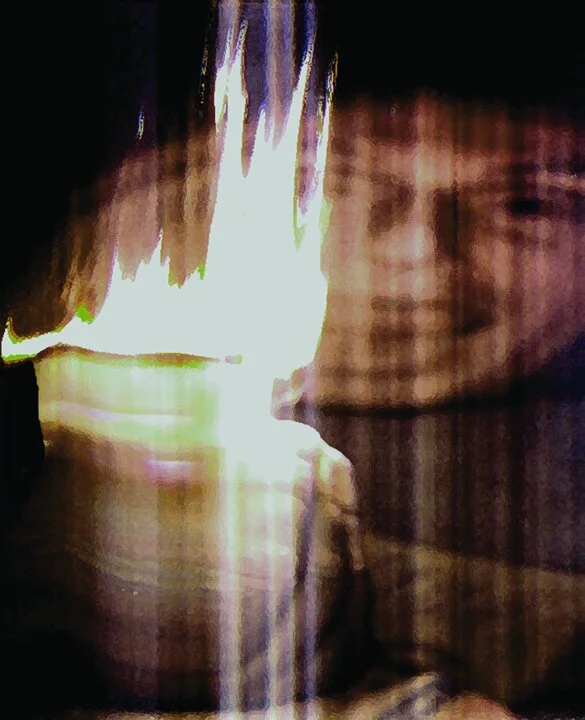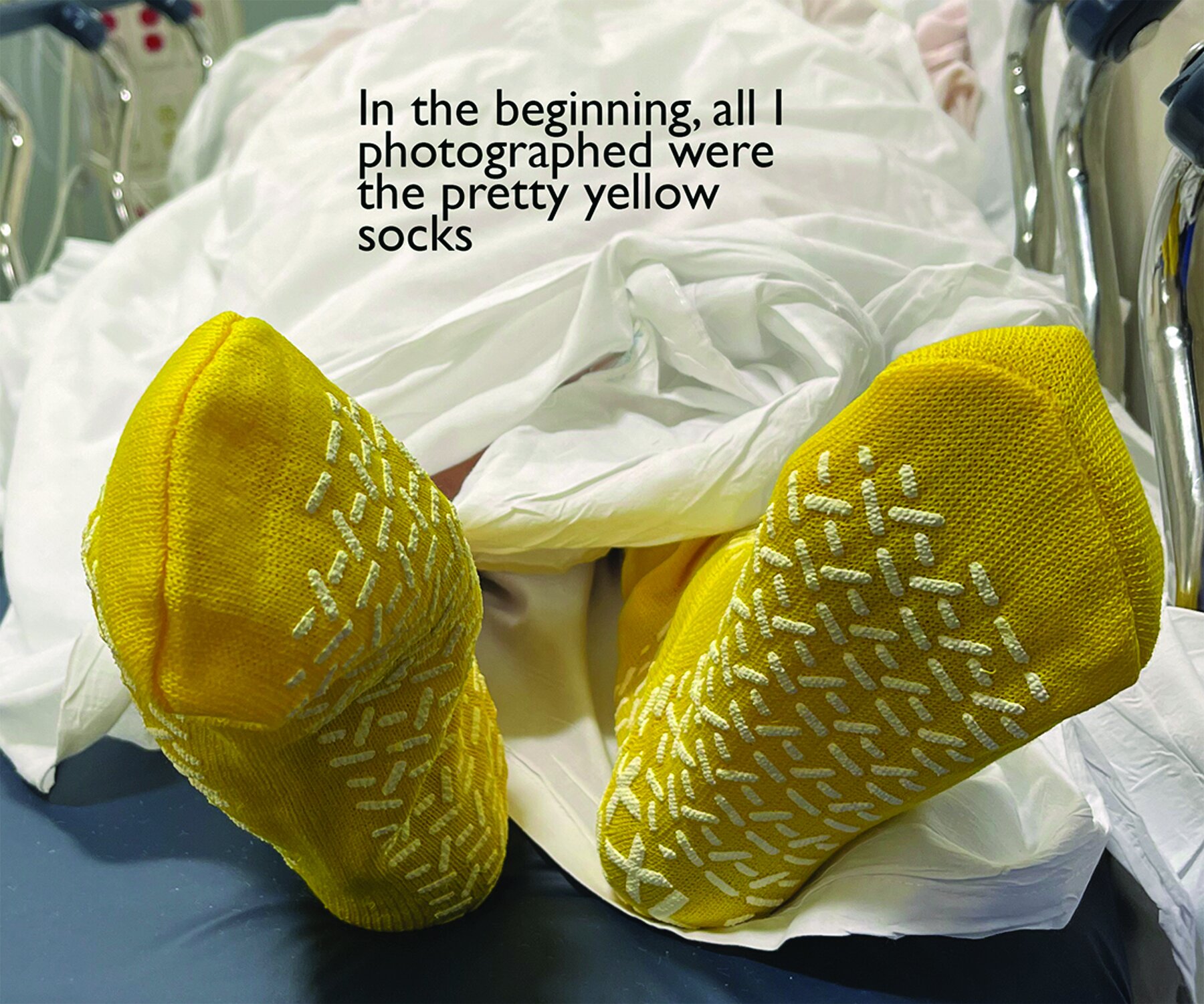Alte #10: SUDDENLY
Eliza Newman-Saul
SUDDENLY
by Kate K. Johnson
It is as it once was
tonight, the fields lit, an hour
from sunset, pure gold
slant on the green trembling stalks
of tall lace whites — gold also
on the black bears’ fur
besides the shadowing lake
where we looked, finally,
and saw ourselves shaken,
loosed by the wind’s mercy
and lack of mercy. Small things:
words — without flesh
and faint
against the lived moments — still
isn’t it right to speak? And failing
to say God
held us then as these gold strands
hold the body of earth
taut in gossamer. Though the thought
of their frailty breaks
over me, knife sharp,
the fields blaze up higher
just before dark. Isn’t it true? —
so many lifetimes
are given away
for the purpose of keeping
a safe distance — but the heart is never safe,
never fenced in. This is my last secret, my last skin
given to you. Please, don’t make it only sad;
let it fill you, as now
on the sloping field, two black cubs fill themselves
deeply with wild berries — such snorting
the indelicate mouthfuls,
as if to have, in one night,
all the summer’s worth.
Lawrence Bush
SUDDENLY I WAS WALKING
by Susan Griss
After crawling around on all fours for months, suddenly I was walking.
After a lifetime of homework and tests, projects and reports,
suddenly I was in college.
After years of pliés, mirrors, and rehearsals,
suddenly I was a professional dancer.
After the timelessness of kissing, dreaming, and love-making,
suddenly I was married.
After five dark years of infertility, suddenly I was the mother of twins.
After decades of teaching and learning, teaching and learning,
suddenly I was an expert.
After letting go of my primary parental role, suddenly I was a grandmother.
After spreading my passion for learning through movement across the nation,
suddenly I was retired.
After finding the balance of breathing in and breathing out,
suddenly I will die.
Mark Berghash
SPRING (AND THE VIRUS) AND ALL
by Jessica G. de Koninck
Suddenly the sun strikes
the magenta lips of the azaleas
that overnight have come
into full bloom, and the daffodils
lift their open mouths to drink
in warmth. Peony stems push
through the almost naked ground.
I stand at the window near the lake.
No one walks around.
Two azalea bushes, long dug up and gone,
guarded the front door of my childhood
home. Their blossoms the color of salmon flesh.
I thought them terribly ordinary.
Four days ago I visited my mother
thinking, who knows when I’ll be back again.
She said with impatience, “You know,
this is God’s work.” Her certainty from within
the clouds of dementia startled me,
but I don’t know what she meant.
My mind turns to you
Dr. Williams, driving your daily rounds,
when doctors made house calls,
writing poems on prescription pads.
Tuberculosis still kills people. Other
things do too. New things. On the lake
outside my window one ordinary
blue heron dives for fish.
Lawrence Bush
HAIR COLOR
by Nancy Lubarsky
I never knew my father colored my mother’s hair.
It happened at night, after I went to sleep. One
time their muffled voices woke me. They didn’t
know I was there. I sat in our small apartment’s
dark living room and peered around the corner.
They both sat in the kitchen, her back to him,
covered with old sheets, a few more spread
underneath. At first, I wasn’t sure what was
going on. A sour smell stung my nose. She leaned
back against his chest, her eyes closed, his thick
arms above her head. He rubbed her temples,
then one plastic-gloved hand picked up the narrow
brush, dipped it in the liquid mixture. Slowly, he
parted her hair and dabbed at the white roots.
There was just a swish sound as he stroked
back and forth, lifting layer after layer of hair.
They hardly spoke except when he whispered,
tilt your head. I saw him catch a drip with his
finger before it reached her chin. He wiped her
cheek with a cloth. I dozed off for a while, until
I heard her chair scrape the floor. There they
were, in the same position – her forehead and
temples now framed with what seemed like mud.
They were both so still. Just waiting.
SOMETIMES — NOT ALWAYS
by Gina Larkin
Sometimes
when my ankle swells
making relevées shaky
or my elbow throbs
making writing a chore,
when the mirror reflects
way too much
everything;
sometimes
when I’ve read the same paragraph
over and over
and still don’t see its point;
sometimes
when age spots and thinning hair
and “would you like a seat, ma’am?”
start to matter,
when the eyes of a man
who once would have bought me a drink
look through
an invisible me,
then
I am old
But not today.
Today
I have cleaned the last closet
even the topmost shelf,
today
I have played tag in winter’s first snow
and planted ivy in a new blue pot,
today
the sun gashed the sea
with one swift stab
and you brought me wine in the candlelight.
Mark Berghash
STILL
by Esther Cohen
Suddenly I am not
even a little young
especially body parts
I’ve known
for a while
age was coming i
if I was lucky
not prepared
for now.
Still my hair
is red
nails too
familiar pile
of books
by my bed:
notebooks and notes:
not sleeping still,
wondering if shoop the singular of sheep.
Bea Elderbee
SEINFELD REDUX
by Marissa Piesman
I am turning 70 this year. I think of my grandmother at 70, on a Bronx bench, in her Persian lamb coat and Cuban heels. Then I try to imagine her on a treadmill in the gym.
I stopped lawyering at 66, ran around for two years and then got hit by COVID. The physical symptoms abated but the cognitive deficits continued. I remain plagued by anomia; it is difficult for me to remember proper nouns. I forget the names of both people and places. I have become, for most intents and purposes, an old person. There’s only so much a gym membership can do.
I commenced a campaign to recapture my youth. I listened to old Bob Dylan albums. I donned spandex leggings and running shoes. I let my hair grow down my back, the longest it’s been since 1969. None of this made me feel any younger. Then Netflix decided to rerun the entire Seinfeld series. It was first aired in 1989, while I was still in my thirties. I never missed an episode, not even while giving birth to a daughter, and I grieved when it went off the air in 1998.
I’m re-addicted. I can’t turn it off. They all act like morons, and I still relate. There I am, back on West 74th Street, an illegal subtenant in a rent-stabilized building. I could be any of them — Jerry the successful comedian, George the loser, Elaine who speaks truth to power. I even relate to Kramer, the doofus. I find myself aping his mannerisms from time to time. Each time he shrugs his shoulders or raises his eyebrows or falls on the floor, I swoon. A doofus with a high testosterone level; I find there’s something appealing about that, especially if I am watching past midnight.
Have I mentioned that I am turning 70? Why do I keep thinking of my grandmother on Mount Eden Parkway, sitting on a bench? It is much more entertaining to pretend that we’re all still in our thirties and relating to our contemporaries. They are so idiotic, but soooo amusing.
I did not mind turning 20 or 30 or 40 or 50 or 60. I was still working as a lawyer, as I had for so many years. But 70 is something else. I did everything behind schedule. I didn’t get married until my mid-thirties. I waited until I was 40 to get pregnant. I got my first dog at 50. But somehow, while I am streaming Seinfeld episodes on Netflix, into the night . . . there I am again, acting like a superannuated adolescent. Goofy. Silly. Waiting for Kramer to fall over or George to make a terrible faux pas. Even if it’s just happening on my laptop’s screen.
ACCIDENTAL INDIGO
by Doug Eisman
my elbow toppled an overflowing bottle of indigo ink
the ink swam around as it coated and covered the drawing board.
those deep blue slow moving puddles over saturated the drawn surface
the drawing was forever gone
the deep blue ink was a river that couldn’t find the sea
the ink settled atop the most colorful, complicated and detailed areas of the drawing
it obliterated all prismatic pinnings
my vision
my playground
my psalms
hours of rendering buried beneath a deep blue avalanche
the entire drawing gone in a matter of seconds
now we can no longer see the stars falling through the roof
I can no longer see the veins through my skin
pulsating jellyfish
kabuki dancers
chicken flikas
egg candlers
kapparot chickens
dharma wheels
ominous skies
indigo ink
Dana Jacobs
ASSEMBLY
by Nancy Lubarsky
You can barely hear the click-click of the projector. We
file into rows, sit down (who knew what for?). The words
Art History banner across the screen, voices dart around
the auditorium, muffling the audio narration. Each slide
pauses, winks at us, then moves on. One girl sits alone
close to the projector. The next slide – a ten second flash
of two figures. In the center, surrounded by naked youths,
a reclining boy and an older man reach for one another,
fingers nearly touching. We high-schoolers have no inkling
about Michelangelo’s masterpiece, that God was about to
give Adam life. Not even the exposed penis calls to us. But
then, the silhouette of an arm rises up, hand extends. Its finger
fills the gap between God’s and Adam’s. The room’s energy
follows the arm’s lift. We see it tremble. The slide disappears.
The arm retracts. Silence. Within minutes everyone knows
exactly who did it. The vice principal escorts her out.
Afterwards, she can’t explain why. But her reputation
was sealed. Years later, it’s all we remember about her.
SUDDENLY
by Zelda Gamson
I find myself in the place I want to be, not far from the place I don’t want to be. I look out my window and see the scolding crows, the song sparrows, the oaks, the maples. I have been here for a week and have gone to two parties and an art opening. Masked people come up to me and want to hug. One tells me her life since I left. I know her face but not her name. Another gossips about the people who bought my house.
I am driving again and every curve reveals a new scene and every scene brings back another. I check out the passing farm stands. They are still where I left them but did they change while I was gone? I am glad to see they still have their boxes of dollar bills and coins for buyers to make change. I bag a few pears and a container of feta cheese.
The cliffs at the beaches have turned into hillocks due to erosion and heavy winds but the beaches are intact and the ocean as unpredictable as ever. On wild, windy days I know where to go to see the surfers, some young and female and some older and male. On milder days, I can walk up the beach to a part filled with stones of many colors, shaped and polished by the sea. I take two back to my new home.
I keep running into people I knew before we disappeared behind masks: The manager of the Brazilian grocery store who opened the first health store 30 years ago. The dentist who is the president of the Jewish congregation. The clerk at the hospital who used to work for the city of Boston. And the barber, Phil, who used to cut Bill’s hair.
I miss seeing my friend, June, a member of the Wampanoags, a glowing woman who drove us to Boston in the 90s when Bill got sick. She made her way around the boards of the non-profits on the island and worked the register at the Thrift Shop. I was planning to run into her and catch up. Now she is gone. I go to her memorial and talk to her family and friends and it is sweet.
Every day I get up early and throw a coat over my nightgown, hat and gloves flying after me. I sit on a folding chair looking at the clouds scudding across the sun. The daylight ends quickly and I find myself absorbed in something at my desk and miss the sunset. I must remember to go out again to check out the sky before it goes dark.
If it gets to be dark when I look up, the stars will draw me outside.
I thought I had lost this home of mine. And suddenly, I realize it’s been waiting for me.
Judith Sokoloff
DAYS OF SUDDENLYS
by Judith Sokoloff
We’re going to make it to the third cove today, in that short time between low tide and advancing sea. This means climbing over the slippery rocks that cut a path between ocean and cliff. Suddenly, as we round the last bend, a trail of missing neon appears. The emerald green E from EAT, the Caribbean blue S from Westside Tavern, the hot pink Cs from Cut n’ Curl. Thousands of neon letters speckle the shore creating anagrammatic poems and messages. Suddenly the tide moves in. We dash back over the rocks, hugging the wet cliffs, reaching the open beach just in time. I ask my friend, Did you bring back a letter? No, he says, did you?
I hike the trail up the hill to where animals hang out in the fog. Suddenly a herd of zebras appears. Black and white stripes shift against a multi-green landscape. Suddenly three hungry tigers approach. Sensing the predators, the zebras speed up their movements until they create a wild optical illusion. The tigers are paralyzed with confusion, giving the zebras a chance to get away.
I’m driving fast on a multilane superhighway (this one’s a dream), talking to my passenger friend. Suddenly the highway ends, the car is flying, careening toward the sea. I wake myself, gasping, because I can’t bear the terror of the moment of knowing that this is the very end. Suddenly my window explodes with a pinkish light, the morning-blue sky, white clouds in motion. An enticing breeze blows in and I am ready to meet a new day of suddenlys.
Suddenly I’m in love! And not with my spouse.
And suddenly I’m not with him.
I’m in love as well
With suddenlys.
Bernard Greenwald









